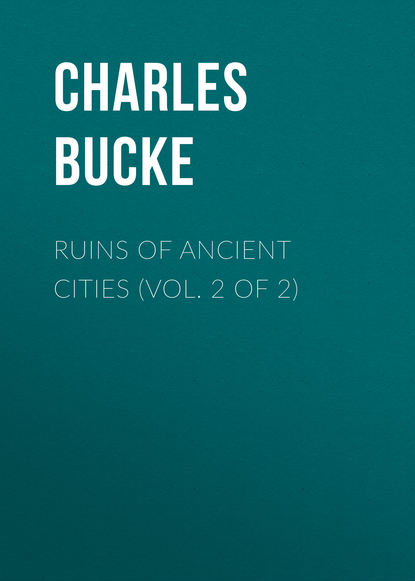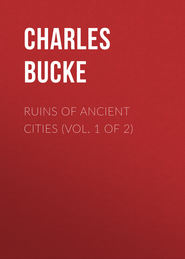По всем вопросам обращайтесь на: info@litportal.ru
(©) 2003-2024.
✖
Ruins of Ancient Cities (Vol. 2 of 2)
Настройки чтения
Размер шрифта
Высота строк
Поля
It is only by viewing the stupendous prospect afforded in these classical regions, that any adequate idea can be formed of Homer’s powers as a painter. Neptune, placed on the top of Samothrace, commanding a prospect of Ida, Troy, and the fleet, observes Jupiter upon Gargarus turn his back upon Troas. What is intended by this averted posture of the God, other than that Gargarus was partially concealed by a cloud, while Samothrace remained unveiled? a circumstance so often realised. All the march of Juno, from Olympus, by Pieria and Æmathia to Atlas, by sea, to Lemnos; and thence to Imbrus and Gargarus; is a correct delineation of the striking face of nature, in which the picturesque wildness and grandeur of real scenery are further adorned by a sublime poetical fiction. Hence it is evident, that Homer must have lived in the neighbourhood of Troy; that he borrowed the scene of the Iliad from ocular examination; and the action of it from the prevailing tradition of the times. – Clarke.
292
Homer; Herodotus; Diodorus; Strabo; Suetonius; Pliny; Tacitus; Plutarch; Aulus Gellius; Arrian; Justin; Chandler; Bryant; Rennell; Clarke; Gell; Hobhouse; Franklin.
293
Drummond’s Origines.
294
Ezekiel, ch. xxvii.
295
So we interpret, “Javan, Tubal, and Meshech, were thy merchants; they traded in the persons of men.” – Ezekiel xxvii. 13. Thank Heaven! a similar iniquity has been done away with in this country, by an act of generosity not to be paralleled in the history of the world. – Twenty millions of money!
296
The sacred writings often speak of Tyre as an island. “Be still, ye inhabitants of the isle; thou, whom the merchants of Zidon that pass over the sea have replenished. Pass over to Tarshish; howl, ye inhabitants of the isle. Is this your joyous city, whose antiquity is of ancient days?” – Chap, xxiii. verses 2, 6, 7. In Ezekiel, ch. xxviii. ver. 2, “Is it in the midst of the seas?”
297
“And it shall come to pass after the end of seventy years, that the Lord will visit Tyre, and she shall turn to her hire. (xxiii. 17.) And her merchandise and her hire shall be holiness to the Lord; it shall not be treasured nor laid up: for her merchandise shall be for them that dwell before the Lord, to eat sufficiently, and for durable clothing.” (v. 18.)
298
This was foretold by Zechariah, ch. ix. 3, 4.
299
B. C. 332.
300
Diodorus. Arrian says thirty thousand.
301
Vincent’s Periplus, v. ii, 528.
302
“And it shall come to pass, that Tyre shall be forgotten seventy years.” —Isaiah, ch. xxiii. ver. 15.
303
“Her merchandize and her hire shall be holiness to the Lord; it shall not be treasured or laid up; for her merchandize shall be for them that dwell before the Lord.” —Isaiah, ch. xxiii. ver. 18.
304
Parentalia, p. 359.
305
Herodotus; Diodorus; Pliny; Plutarch; Arrian; Quintus Curtius; Prideaux; Rollin; Maundrell; Stackhouse; Wren; Shaw; Gibbon; Robertson; Drummond; Buckingham.
306
Eustace.
307
The situation of Veii has caused some great disputes among the antiquaries; but it seems now to be very satisfactorily placed at L’Isola Farnese, about twelve miles from Rome, not far from La Storta, the first post on the road to Perugia. In the time of Propertius the town had ceased to exist.
Nunc intra muros pastoris buccina lenti
Cantat, et in vestris ossibus arva metunt.
And Florus says of the city; “Who now recollects that it existed? What remains and vestige of it are there? It requires the utmost stretch of our faith in history, to believe that Veii existed.” – (Lib. i. c. 12). Eutropius calls it eighteen miles from Rome, (lib. i. c. 4 and 19); but Pliny (lib. xv. c. ult.), and Suetonius (Galba 1), if compared together, make it only half the distance; and Dionysius, (Antiq. lib. ii.) expressly places it at the distance of one hundred stadia, or twelve miles. The Peutingerian table does the same. – Burton.
308
Liv. v. 21; Sueton. in Neron. 39.
309
Livy; Eustace; Gell.
310
Diodor. Book I. Parag. 1. Art. 3.
311
Pausanias. Book VIII. Chap. 1.
312
Herodot. Book IV.
313
Ibid. Book III. and IV. – Val. Max. Book II.
314
Ibid. and Strabo.
315
292
Homer; Herodotus; Diodorus; Strabo; Suetonius; Pliny; Tacitus; Plutarch; Aulus Gellius; Arrian; Justin; Chandler; Bryant; Rennell; Clarke; Gell; Hobhouse; Franklin.
293
Drummond’s Origines.
294
Ezekiel, ch. xxvii.
295
So we interpret, “Javan, Tubal, and Meshech, were thy merchants; they traded in the persons of men.” – Ezekiel xxvii. 13. Thank Heaven! a similar iniquity has been done away with in this country, by an act of generosity not to be paralleled in the history of the world. – Twenty millions of money!
296
The sacred writings often speak of Tyre as an island. “Be still, ye inhabitants of the isle; thou, whom the merchants of Zidon that pass over the sea have replenished. Pass over to Tarshish; howl, ye inhabitants of the isle. Is this your joyous city, whose antiquity is of ancient days?” – Chap, xxiii. verses 2, 6, 7. In Ezekiel, ch. xxviii. ver. 2, “Is it in the midst of the seas?”
297
“And it shall come to pass after the end of seventy years, that the Lord will visit Tyre, and she shall turn to her hire. (xxiii. 17.) And her merchandise and her hire shall be holiness to the Lord; it shall not be treasured nor laid up: for her merchandise shall be for them that dwell before the Lord, to eat sufficiently, and for durable clothing.” (v. 18.)
298
This was foretold by Zechariah, ch. ix. 3, 4.
299
B. C. 332.
300
Diodorus. Arrian says thirty thousand.
301
Vincent’s Periplus, v. ii, 528.
302
“And it shall come to pass, that Tyre shall be forgotten seventy years.” —Isaiah, ch. xxiii. ver. 15.
303
“Her merchandize and her hire shall be holiness to the Lord; it shall not be treasured or laid up; for her merchandize shall be for them that dwell before the Lord.” —Isaiah, ch. xxiii. ver. 18.
304
Parentalia, p. 359.
305
Herodotus; Diodorus; Pliny; Plutarch; Arrian; Quintus Curtius; Prideaux; Rollin; Maundrell; Stackhouse; Wren; Shaw; Gibbon; Robertson; Drummond; Buckingham.
306
Eustace.
307
The situation of Veii has caused some great disputes among the antiquaries; but it seems now to be very satisfactorily placed at L’Isola Farnese, about twelve miles from Rome, not far from La Storta, the first post on the road to Perugia. In the time of Propertius the town had ceased to exist.
Nunc intra muros pastoris buccina lenti
Cantat, et in vestris ossibus arva metunt.
And Florus says of the city; “Who now recollects that it existed? What remains and vestige of it are there? It requires the utmost stretch of our faith in history, to believe that Veii existed.” – (Lib. i. c. 12). Eutropius calls it eighteen miles from Rome, (lib. i. c. 4 and 19); but Pliny (lib. xv. c. ult.), and Suetonius (Galba 1), if compared together, make it only half the distance; and Dionysius, (Antiq. lib. ii.) expressly places it at the distance of one hundred stadia, or twelve miles. The Peutingerian table does the same. – Burton.
308
Liv. v. 21; Sueton. in Neron. 39.
309
Livy; Eustace; Gell.
310
Diodor. Book I. Parag. 1. Art. 3.
311
Pausanias. Book VIII. Chap. 1.
312
Herodot. Book IV.
313
Ibid. Book III. and IV. – Val. Max. Book II.
314
Ibid. and Strabo.
315






